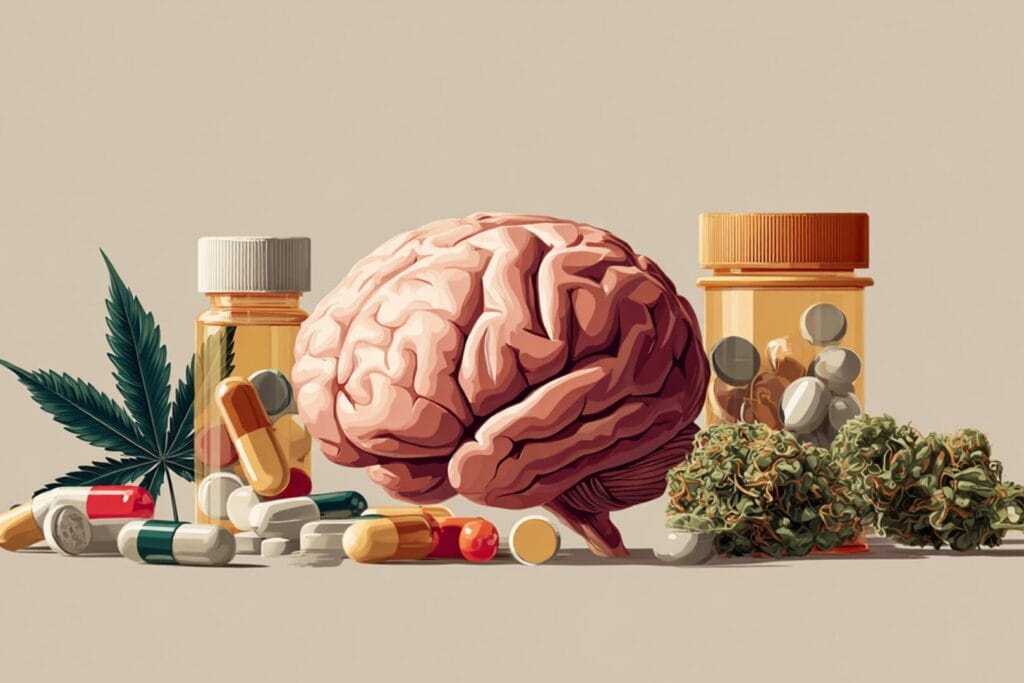What Is Alcohol Use Disorder (AUD)?
Alcohol use disorder (AUD) is characterized by the uncontrollable use of alcohol despite physical, mental, and social consequences. The health consequences of alcohol abuse are severe, impacting the brain and body.
The Centers for Disease Control and Prevention (CDC) reported that between 2015 and 2019, excessive alcohol use led to more than 140,000 deaths and 3.6 million years of potential life lost (YPLL) each year in the United States. 1
Alcohol use disorder can also be referred to as alcohol abuse, alcohol dependency, and alcoholism.
A Closer Look at AUD
The dangers of too much alcohol include increased risk for cancer, high blood pressure, heart disease, impaired judgment, memory loss, difficulty walking straight, and other alcohol-induced disorders. In addition, binge drinkers have more significant risks of developing severe injuries such as traumatic brain injury and death due to traffic accidents or drowning while intoxicated.
The reasons for alcohol dependency vary from person to person, but certain factors can increase the risks of developing an addiction. These include genetics, environment, stress, and peer pressure.
How Can Drinking Too Much Affect Me?
Drinking too much can have a wide range of effects on the body and mind. The more alcohol is consumed, the more negative consequences are experienced. The most common alcohol-induced disorders include the following: 2
- Brain damage, including dementia
- Heart disease
- Despair, depression, and suicide
- Cancers of the breast, liver, colon, and mouth
- Fetal alcohol syndrome (if exposed to alcohol before birth)
- Accidents like falls or burns
- Injuries like fractures or drowning
- Liver problems, such as cirrhosis, hepatitis, and fatty liver disease
- Blackouts
- Legal issues, such as assaults, DUIs, and homicide
What Causes Alcohol Use Disorder?
The following are some causes of alcohol substance use disorder:
Genetics
Genetic predisposition is one of the causes of alcoholism. Specific genes are associated with a higher likelihood of substance abuse and addiction. For example, a child whose parents had alcohol use disorder is likely to develop it themselves due to their genes.
Early Childhood Events
Early exposure to alcohol and drug use can increase the risk of developing alcohol use disorder later on. In addition, studies show that alcohol abuse is six to twelve times more common in individuals who experienced physical abuse during childhood compared to those who have not. 3
Attempts to Relieve Emotional Pain
People who suffer from an alcohol disorder often attempt to relieve emotional pain by using alcohol. Getting drunk on alcohol can often reduce the feeling of negative emotions, which return once the alcohol wears off, leading them back to drinking more heavily. This creates a vicious cycle where the individual becomes psychologically dependent on alcohol.
Experienced Trauma
Alcohol use disorder can be traced back to a history of trauma or abuse. This includes experiencing emotional or physical trauma, such as being in a car accident or losing a close relative or friend. Trauma can often lead to post-traumatic stress disorder (PTSD) and other mental health issues, contributing to alcohol addiction problems later on down the road.
A Family History of Alcohol Problems
If an individual’s parents or sibling abuses alcohol, they may be at greater risk of developing an alcohol use disorder diagnosis. This is due to observing and learning poor drinking habits and forming a warped perception about how they should use alcohol.
Mental Health Issues
Certain individuals who use alcohol may have mental health conditions like depression or anxiety, making them more likely to develop severe alcoholism and vice versa. Individuals with mental health issues may turn to alcohol to cope with symptoms like stress and low moods.
How Much Alcohol Is Too Much?
While the National Institute on Alcohol Abuse and Alcoholism (NIAAA) defines a standard drink as containing 0.6 fluid ounces of pure alcohol, the amount of alcohol that causes alcohol-related conditions and problems varies from person to person. The body processes alcohol differently depending on age, weight, gender, genetics, medical conditions, etc. 4
Too much alcohol is defined as more than a drink per day for women and two per day for men. However, contrary to popular belief, there’s no safe amount of alcohol. Even if alcohol is consumed only once or twice a week, there is a risk of developing an alcohol use disorder.
How Is Alcohol Use Disorder Diagnosed?
There are several alcoholism diagnosis criteria for alcohol use disorder based on the Diagnostic and Statistical Manual of Mental Disorders, Fifth Edition (DSM-5). This is a guide published by the American Psychiatric Association to help doctors diagnose mental illnesses.
To be diagnosed with alcohol use disorder, a person must exhibit two or more of the following signs of alcohol dependence in twelve months:
- Drinking more than intended
- Recurrent alcohol cravings
- Failure to control alcohol intake once drinking has begun
- Increased tolerance to alcohol’s effects (more drinks are needed to get the same effects)
These criteria and other tests can help spot alcohol-related disorders and speed up treatment.
What Are the Symptoms of Alcohol Use Disorder?
Alcohol use disorder is often diagnosable and can be treated—but what are the symptoms of alcohol use disorder? The symptoms of alcohol-induced disorder vary from person to person, but they generally include:
- An uncontrollable urge to drink
- Lack of control over how much alcohol is consumed
- Negative thoughts when not drinking alcohol
- Drinking in risky situations
- Drinking that interferes with interests and activities that were once enjoyed
- Continuing to drink even though it causes problems or makes them worse
- Stopping important activities or doing them less often because of alcohol
Alcohol Use Disorder Severity
Alcohol use disorder can range from mild to severe:
- Mild: People who have mild AUD may be able to stop drinking for brief periods but then start again. They can drink alcohol in moderation but not consistently.
- Moderate: People with moderate alcohol misuse disorder may have problems at work or school and trouble in relationships because of their drinking. They are often unable to stop drinking, even when they want to.
- Severe: Individuals with severe alcohol use disorder may experience withdrawal symptoms if they try to quit drinking, such as sweating, nausea, vomiting, sudden changes in heart rate or blood pressure, tremors, and convulsions. Additionally, severe alcohol use disorder can cause serious health issues like alcohol poisoning and liver failure.
Find Treatment for Alcohol Use Disorder at San Diego Detox
If you are struggling with an alcohol disorder, you are not alone. In 2019, a national survey found that 14.1 million adults eighteen years and older and 414,000 adolescents aged twelve to seventeen had alcohol use disorder. 5
At San Diego Detox, we specialize in helping patients struggling with alcohol misuse disorder recover, maintain sobriety, and regain their lives. We offer a variety of treatment options, including:
Behavioral Therapies
Behavioral therapies include cognitive behavioral therapy (CBT), motivational interviewing, and 12-Step facilitation. These therapies help patients understand the underlying causes of their alcohol addiction and learn how to change their behavior patterns to stay sober.
Medications
In addition to behavioral therapies, some patients may benefit from medications, such as naltrexone or topiramate, which help manage withdrawal symptoms when trying to quit alcohol usage.
Support Groups
Patients can participate in group therapy sessions with other recovering clients to share experiences, build relationships, and encourage one another on the road to recovery.
For more information on how to seek help for alcohol use disorder for yourself or a loved one, please reach out to us at San Diego Detox immediately.
Resources
https://www.healthline.com/nutrition/alcohol-good-or-bad
https://bmcpsychiatry.biomedcentral.com/articles/10.1186/s12888-021-03566-8
https://pubs.niaaa.nih.gov/publications/practitioner/PocketGuide/pocket_guide2.htm#:~:text=A%20standard%20drink%20is%20any,fluid%20ounces%20or%201.2%20tablespoons
https://www.niaaa.nih.gov/publications/brochures-and-fact-sheets/understanding-alcohol-use-disorder






